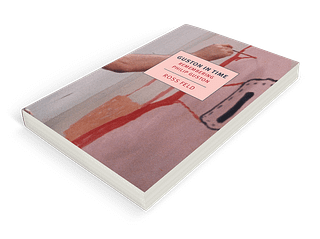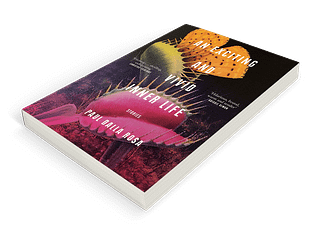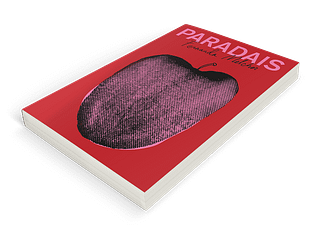Criticism Online
The Artist’s Seven Minutes
By Ariana Harwicz & Ariana Saenz Espinoza
Translated from the SPANISH by SARAH MOSES

August Strindberg said that Claude Monet must be mad, while Henry James said he didn’t understand him. Baudelaire said that Monet was attempting to paint modernity. What is certain is that while other painters of his time spent a few hours at their easels and then lived, drank, and didn’t paint again until the next day, Monet couldn’t sleep because the colors pursued him in his dreams. “I suffer greatly, but what is it I’m after? I’m after the impossible. Others paint a house, a bridge, a boat. I want to paint the air where the house, the bridge, the boat are found. I want to paint the beauty of the air where they are.” The light he sought to capture this air that was transient, fleeting, contingent. It lasted just seven minutes. Every day, Monet had just seven minutes “to trap the butterfly,” as Armando Discépolo described it in Stéfano. Seven minutes in a trance outside his small atelier packed to the rafters with unfinished canvases.
The French author Joseph Ponthus wrote a single novel before he died, or died after having written a single novel: On the Line, recently translated into English by Stephanie Smee. Originally a teacher and littérateur, Ponthus followed his beloved wife to Brittany, saying that when he married her, he married her truth — a declaration of love out of step with the times. In Brittany, he was only able to find temp jobs in slaughterhouses and at seafood and fish processing plants. Joseph, and his novel’s protagonist, rose every day at dawn to meet a coworker who drove them to the factory outside the city. In his book, a long poem without punctuation, or with the punctuation of absence, Ponthus wrote the diary of a worker on the production line. “I discovered the factory when I was forty. It was a real shock because parts of it are stuck in Chaplin’s Modern Times,” he said. He wrote in his head during his hours at work and, upon returning home dejected, he recorded the omnipresence of the blood and various unfamiliar organic fluids, the heart rate of the slaughter, the pulse of the minutes. This “intellectual with a classics degree” was saved by the poems he knew by heart, and wrote “to sever himself” from the “functional man” who had been fused with machinery and an employee number. In the poem, he documents the cow udders at his feet, the calf hooves, the excrement of animals that know they’re going to die, the recently sliced organs, the marks left on the wall by the cattle run, and the stench of the animals’ terror. On the Line found a way out of the habitual range within which literary politics operate: it won more than ten prizes in France, sold thousands of copies, and was translated into several languages. Ponthus toured bookstores across the country, telling readers, but also the elite, of the bloodied hands and discarded carcasses that were part of the factories’ criminal regime. He also told them of his love for the songs of Charles Trenet, without which he couldn’t have endured it, he said, and the literature of Georges Perec, and Pok Pok, the dog his beloved wife had given him. He spoke of the pleasure of a good cut of meat, too — the factory didn’t turn him into a vegan. One year after the book was released, at the end of 2020, the author somberly announced from his hospital bed that he had cancer. He continued to write his diary, in high spirits: “I hope the tumors and metastases die as soon as possible but that I’m around as long as possible.” What Ponthus discovered was the factory as an environment at once rough and torturous, mechanical, oppressive, but also, paradoxically, a place of great beauty. What Ponthus discovered outside the literary field, outside the logic of the literary market, was that the order of the factory was the order of the world, and that it was his duty to write about this paradox. The Ponthusian gesture is that of the Nietzschean paradox.
A writer is always agonizing. “There are some very well-known people who never wrote. Sartre, for example, was a moralist always preoccupied with the political context: he never took on pure writing. This is not a value judgment, there are people who believe they write and there are people who write,” said Marguerite Duras. The statement created a division, as if there were those who Write and others who only write. Jean Genet represents a certain European writer well — one whose conscience is buried in the fissure between wars, in the bloody trench between massacres. Genet inverts everything, turns the bad into good. From the cradle, he absorbed an unrelenting hatred for institutions, for France itself. He was a brother to Céline in designating a common enemy: treason. Genet used the language of this enemy, but rather than out of ideological support for Nazism, anti-Semitism, or Fascism, he did so as an ethics. And so, everything that society adored, he hated; everything that civilization sanctified, he profaned. He aspired to inhabit the world, but this aspiration was to be compensated by a contrarian discourse: “I don’t belong to this world, I’m a crook, I’m a lout.” Genet worked with excretion. With remains. But the remains of what? Like Ponthus, he wrote of the fracture of culture, of the paradoxical tension. Who talks about factories in the twenty-first century, about the technician neck deep in blood and shit? Ponthus turned to action outside the lucrative business of contemporary literature, as Kafka would have put it, outside the assassins’ range. In this sense, a work that doesn’t fail, a text that doesn’t fail, is one that accepts the poetics of paradox and isn’t sparing with the horror.
“Auschwitz is not a dream,” wrote Léon Poliakov in 1964. Eleven years later, the novel Fatelessness by Imre Kertész was published. From leaving the wagon, to the moment the decision is made at the train station, to arriving at Auschwitz-Birkenau, twenty minutes pass, according to the narrator’s calculations. What are twenty minutes? A logical sequence in the implacable chain of time, step by step, minute by minute, the repetition of an immutable ritual that is part of the machinery’s many processes. With the irony so characteristic of his work, which does not go so far as sarcasm, and even contains a disconcerting, shameless joy, Kertész turns towards the paradox: “I would so much like to live a little longer in this beautiful concentration camp!” The paradoxical beauty of the extermination camp or the slaughterhouse, the disturbing revelation, occurs in the fictional space of literature, in its grammar. Yet “language is not grammar alone,” notes translator and writer Adan Kovacsics. “Rather, it’s an entire network of meanings and references that originate in non-linguistic depths.” It’s from these non-linguistic depths — where the house, the bridge, the boat are found — that writing also emerges, and thus, perhaps, a strange happiness. Fatelessness ends as follows: “. . . and further down the road, I now know, happiness lies in wait for me like an inevitable trap. Even back there, in the shadow of the chimneys, in the breaks between pain, there was something resembling happiness. . .. Yes, that’s what I’ll tell them the next time they ask me: about the happiness in those camps. If they ever do ask. And if I don’t forget.”
Even when Kertész was awarded the Nobel Prize, after having remained relatively unknown for forty years, the happiness he spoke of continued to spark incomprehension and aggression — to such an extent that he was treated as an anti-Semite. Kertész is known to have been a great reader of Camus: “For everything to be consummated, for me to feel less alone, I had only to wish that there be a large crowd of spectators the day of my execution and that they greet me with cries of hate,” says Meursault.
The Nietzschean concept of happiness, which associates joy with the capacity to see existence in its tragic dimension, benefits from a certain prestige, at least in theory. But in actual contemporary practice — in intellectual and political circles, and in literature — this link is never realized. No one is willing to renounce their idealism, even when it’s tainted with denial, cowardice, or betrayal (out of inertia). Sartre wrote that it had taken him twenty years to rid himself of traditional philosophical idealism. In his essay At the Mind’s Limits, the Austrian Jean Améry responds to Sartre, saying that for those who were deported the process was a lot shorter: “Mostly, a few weeks in camp sufficed to bring about this philosophical disillusionment, for which other, perhaps infinitely more gifted and penetrating minds must struggle a lifetime.”
Painful truth or merciful lie. In his work of self-interrogation, Dossier K, Kertész responds on the subject of truth: “Truth is no longer universal — that’s a grave fact, but it must be acknowledged. Standing up for oneself: that’s the hardest, it always was. That’s precisely what the moralist runs from.” Throughout his work, Kertész experiences the lie of consolation in a profound way — that is, the lie of writing in a manner that spares the horror and one’s own alienation, of sneaking away. There is nowhere to hide: “To write is to reveal oneself,” the Austrian author Reinhard Kaiser-Mühlecker said recently. Oppressive as the wound may be, it is here that the butterfly appears, like a mirage.
“We have our own domestic Chechnya and a private Iraq,” wrote the Russian poet Yevgeny Yevtushenko in “The Country Called More or Less.” He titles another poem “Three Minutes of Truth,” and that is all that’s within reach. Afterwards, we begin to lie. Three minutes, or seven, or twenty: units that are abstract, elusive, and fleeting. Our cellphones and our networks, spies and archivists, are responsible for diluting them even further. Literature is the last space that’s not a solvent. Writers like Ponthus, and Kertész in particular, crystalize all the horror in their writing, but also all the beauty that a minute of truth contains. The rest is pure logic.
This essay was originally published in Spanish by Infobae.


